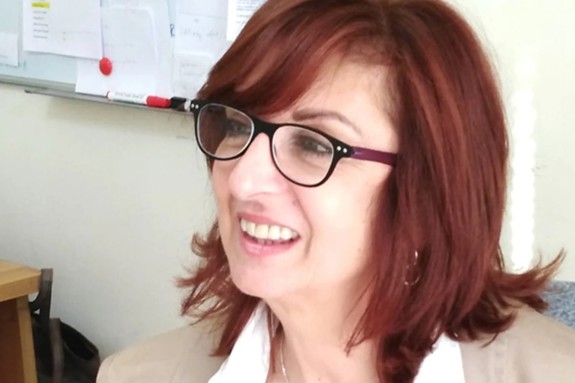“My commitment to the humanitarian cause surpasses my own expectations”
When Christine Fares, started at the ICRC at 19 years old, she was hired to work as a secretary while finishing her studies in Lebanon. Now she is a Restoring Family Links (RFL) field officer in the Beirut delegation.“I fell into the humanitarian sector much like Obelix fell into the cauldron of magic potion! I was still a student with very little experience when I started working, but the ICRC saw my dedication and gave me a chance. Now I am in a fortunate position where I can offer similar opportunities to other young people with potential who want to work for the ICRC.”

“As a resident staff member, the challenge for me was that I needed to struggle with war both as a humanitarian aid provider as well as a personal victim. Looking back at the 39 years I spent with the ICRC, it was hard to deal with that every day. During the civil war I had to leave my two daughters at my mother’s house while I went to work to figure out ways to cross frontlines to reach beneficiaries and help reunify them with their families, but I felt like it was my sacred duty. I had to face my fears and summon up the courage to go into situations where we were in danger of being targeted by snipers and blind shelling, but I never questioned it – in the end my commitment to the humanitarian cause surpassed my own expectations.”
As a Restoring family links delegate, Christine traces people who have been separated from their families by conflict or other situations of violence and migration. She also engages with the relevant authorities to help uncover the fate of missing persons in armed conflict.
”Even with today’s technological advances, our RFL team remains relevant”
“When I started working on RFL we didn’t have any phones - and not just no mobile phones, but the land lines were cut too. We didn’t have mail coming in, no smartphones and no social media, so we really made a big difference in connecting family members. Even with today’s technological advances, our RFL team remains relevant because of the large network and relationships we have developed with interlocutors and colleagues from National Societies. Working closely with the Lebanese Red Cross on RFL issues has been beneficial. It helps us provide better services by sharing best practices and enhancing our joint activities”.
“One particularly memorable experience I had, was when I was attending a wedding close to Beirut. When I turned in my seat to get a better view of the bride entering the church, she looked at me surprised and exclaimed, “Madame Christine! Madame Christine!” I didn’t recognize her, but she told me, “You will probably not remember me, my name is Rita, I am 21 now, but when I was ten years old you helped reunite me with my family – I will never forget your face.” This showed me that the people we help will always remember us.
”The family sends me Christmas cards every year – for me this is the greatest kind of reward”
I had helped this girl, her brother and her cousin to be reunited over frontlines from south Lebanon to Beirut through the Museum cross border in the eighties; an unforgettable experience for all of us. I assisted another Syrian family to obtain travel documents and resettle in Ireland. Now they send me Christmas cards every year and let me know how the family is getting on – to me this is the greatest kind of reward.”
Over the years, Christine has become very aware that patience pays off when working with RFL. “RFL requires you to stay persistent, look for alternative solutions, talk to your network and never give up on finding someone. Even when we cannot respond or give an answer to the family of a missing person right away, things like lending a listening ear alone can mean a lot to someone in distress. I have come across so many people who told me how grateful they were to have someone show them empathy, respect and concern when sharing their burden. Things that seem small, like transmitting a brief message, gives people hope.”
Christine Fares
ICRC
